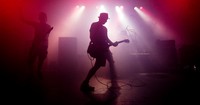Connecting With Your Audience
- Published Aug 31, 1998

Have you ever been to a Christian concert where the headliner has several hit records and draws a good crowd? You watch with anticipation only to be disappointed at how poor the performer's stage presence was, how flat the interaction with the audience seemed and how awkward the movements were? As a concert goer, if you're sitting in your seat thinking, "How could the record company let this person take it on the road?" instead of being drawn into the live concert performance, something's wrong. We sought after industry renowned performance coach Tom Jackson and asked for his input on how an artist can effectively connect with their audience.
%%Christian Musician%%: What is the most important thing to know about connecting with your audience?
Tom Jackson: First, we have to understand why the majority of people go to concerts. You could say that the most important thing is to know the expectations of your audience.
%%Christian Musician%%: Okay then, why do people go to concerts?
Tom Jackson: The obvious reason is to here music, but if that's all they went for they would buy the CD, stay home and listen to a well-produced recording of music. Songwriters go to hear the songs. Musicians go to see how tight the band it, what kind of "chops" the players have and what kind of equipment they're using. Singers listen to the vocalist and compare their voices, while sound and lighting directors evaluate gear, the mix, production, etc.
%%Christian Musician%%: You've just described most of our readers, but aren't they a small percentage of the crowd in attendance at the concert? What about the other 95% of the people?
Tom Jackson: I'm glad you recognize that not everyone who attends a concert is a musician, singer, technician, etc. Except in the case of a Jazzbo or Sting, most of the people who attend a concert are ignorant about music, lighting, sound, etc. People go to concerts for many reasons. They go to laugh, cry, have fun, be ministered to, learn, fellowship, hear great songs and great music (two different things, I might add). People come to "experience" the show. They come for the "moments", they come to get to know the artist or band. This is one of the biggest obstacles that I run across when working with an artist or band. Almost everyone involved thinks that the goal is to technically sing, play and mix the songs perfectly. This is not true anymore than a flawless technical record necessarily makes a "great" record. In a concert, technical perfection is not the goal; the goal is communication. I'm not saying don't be tight - nail the vocals, find great tones - but the common person in the audience doesn't know if you're playing a mixolydian scale, if the drummer is doing a triple stroke roll, or if the singer is hitting a high C or drinking it. It's the same when you go to see a film. Unless you are a producer, technician, actor or film student, you don't go to look at the lighting, camera angles, the technical things like blocking and positioning, the actors' movements, timing or delivery. You go to get pulled into the story, to experience "moments" in the film. A great concert does this, and in the process draws in the musicians, singers, etc., because it is also technically done well.
%%Christian Musician%%: If a great concert is about moments, as an artist, how do you recognize and develop moments?
Tom Jackson: To begin with, it's important to get a feel for the artist or band - their style, who they are, etc. - and find out their strengths. What is unique about them musically and personally? Does the group have interesting harmonies? Is there a great player in the group? Is the artist a storyteller or speaker? What type of sense of humor do they have? Once I've done that, I find a way to communicate and showcase the artists' strengths and uniqueness. Their strengths and uniqueness will indicate what type of moments I want to create for their show.
One way I do this is through the songs. I look for special songs, songs that create moments by themselves. In most cases, there are maybe three songs off a recording that have the ability to do that. That leaves anywhere from seven to nine songs that need to be rearranged so that they will work in a live setting. Some of these are transition songs, songs that connect one moment to another. Some songs need to be stripped - less is more. Some need to be shortened, generally the opener. Some songs need to be fun, to include audience participation. Some need musical moments created by melodies being stretched, solos added, exceptional harmonies being developed, etc. By rearranging the songs we create moments that tug on the audience's heart-strings, moments that touch our funny bone, moments of ministry.
%%Christian Musician%%: What else goes into creating an effective live performance?
Tom Jackson: After we've worked out the songs for the show, we need to work on technical skills. These include angles, zone communication, applause cycles, speaking to an audience, movement, etc. We need to make it interesting for our audience to watch. Without these technical skills, it would be like listening to an artist who knows three chords, two tones and one tempo. It would get old fast. That's exactly what happens with most artists and bands visually. The songs don't all sound the same, so why should they look the same? A good guitar player has many tone changes in a concert. A drummer plays more than two and four in every song. A good singer delivers each song differently. These type of changes are what make the music and the songs work. In the same way that the music needs variation and dynamics to make it interesting, so does the visual part of the concert. The changes I'm talking about visually are often subtle. I use the song as a script. It tells me what the song should look like to communicate it effectively.
One of the most important areas that needs work in order for a live performance to be great is the emotional, psychological and spiritual things artists go through before and while they are onstage. This is the one are in which audiences are not ignorant. They understand human behavior. If an artist leads their audience with confidence and authority, if they understand how to listen to and love their audience and can overcome fear and self-consciousness, the artist will connect with their audience. If the artist has created some fun moments, some touching moments, musical moments, interesting moments, etc., keeps the concert visually interesting and knows how to communicate with an audience, the concert will be a success.
%%Christian Musician%%: Any closing comments?
Tom Jackson: What I like to get artists and bands to understand is that doing a concert is more than taking your songs off a record, putting them in some order and playing them correctly. Just as a great movie is more than taking a book and reading it chapter by chapter while moving around a stage while someone is filming. Just like writing a song, playing an instrument or producing a record, a great concert takes knowledge, hard work and a commitment to do it right.




















